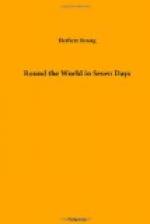“The Euphrates,” he shouted to Rodier.
“Ah! I wish we had time for a swim,” replied the man.
For some time Smith followed the general course of the river, avoiding the windings. Severely practical as he was, he could not pass through this seat of ancient civilizations without letting his mind run back over centuries of time, recalling the names of Sennacherib, Cyrus and Alexander; and how Cyrus had not shrunk from drying up the bed of this very river in his operations against Babylon. On the ground over which he now flew mighty armies had fought, kingdoms had been lost and won, four or five thousand years ago. The passage of so modern a thing as an aeroplane seemed almost a desecration of the spirit of antiquity, an insult to the genius loci.
Hitherto the weather and the conditions for flying had been perfect. The wind had dropped, the sun shone brilliantly, but its heat was tempered to the airmen by the very rapidity of their flight. At length, however, about two hours before sunset, Smith noticed a strange wobbling of the compass needle. It swung this way and that with rapid gyrations, its movements becoming more violent every moment. Suddenly the aeroplane reeled; the sky seemed to become black in one instant; there was a vivid flash of lightning, followed by a tremendous thunder-clap and a flood of rain.
Smith was desperately perturbed. He had run straight into an electric storm. It was hopeless to attempt to make headway against it; the strain upon the planes would certainly prove more than they could stand. He had already slackened speed and planed downwards, so as to be able to alight if he must, with the result that the machine became more subject to vertical eddies of the wind, that continually altered its elevation, now hurling it aloft, now plunging it as it were into an abyss. Once or twice he tried to rise above the storm, but abandoned the attempt when he saw how great an additional strain it placed upon the planes. It seemed safer to keep the engine going steadily and make no attempt to steer. He was no longer over the river, and the ground below was comparatively flat, presenting many a clear spot suitable for alighting; but with the wind blowing a hurricane a descent might well prove disastrous. The worst accidents he had suffered in the early days of his air-sailing had always happened near the ground, when there was no way on the machine to counteract the force of the wind.
All that he could do was to cling on and do his best by quick manipulation of the levers to keep the machine steady. After fifteen very uncomfortable and, indeed, alarming minutes, the violence of the wind abated, and the rain became intermittent, instead of pouring down in a constant flood. The compass was oscillating less jumpily, and it was now possible to see some distance ahead. Owing to the extraordinary behaviour of the compass, the baffling gusts of wind, and the necessity of keeping his whole attention fixed on the machinery, he had lost all idea of direction and even of time, and he began to be anxious lest darkness should overtake him before he had regained his course. But guessing that the area of the storm was of small extent, he hoped to run out of it, and increased his speed, expecting in a few minutes to discover the Euphrates again, when all would be well.




